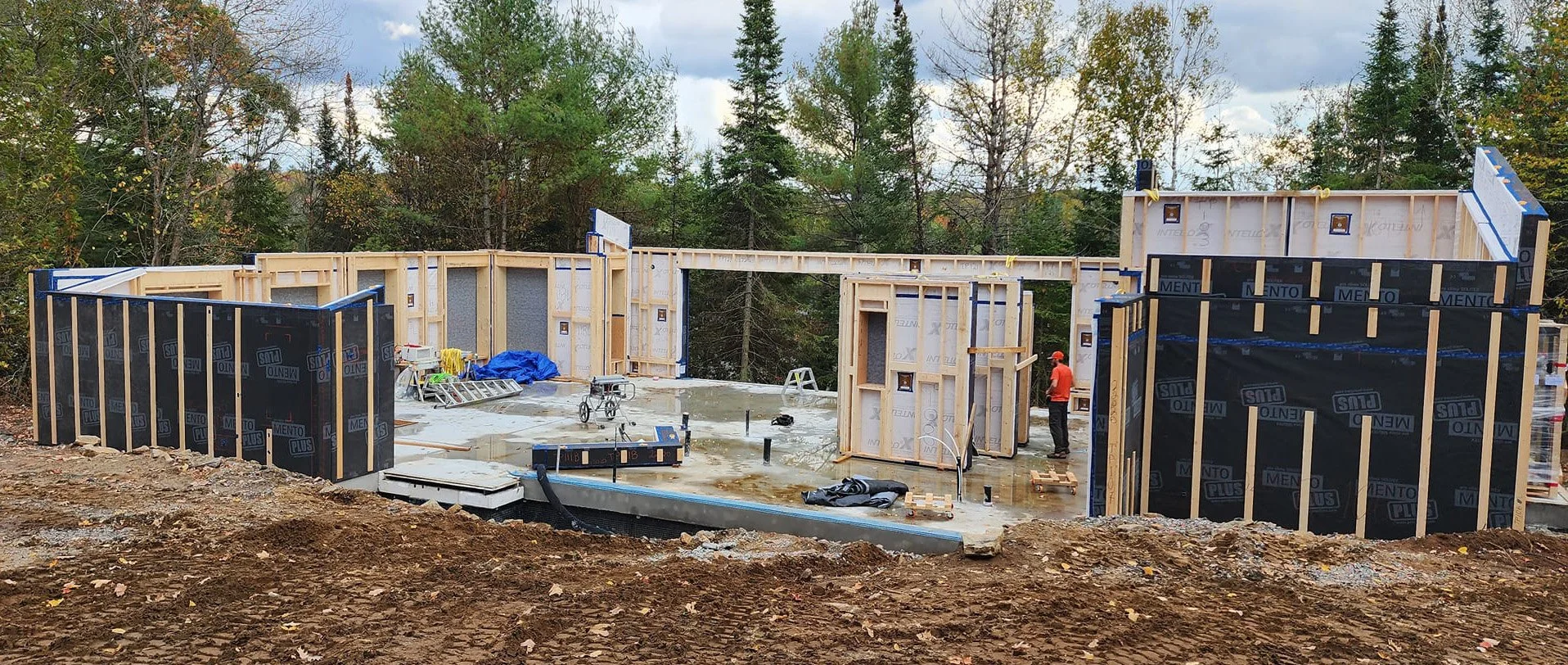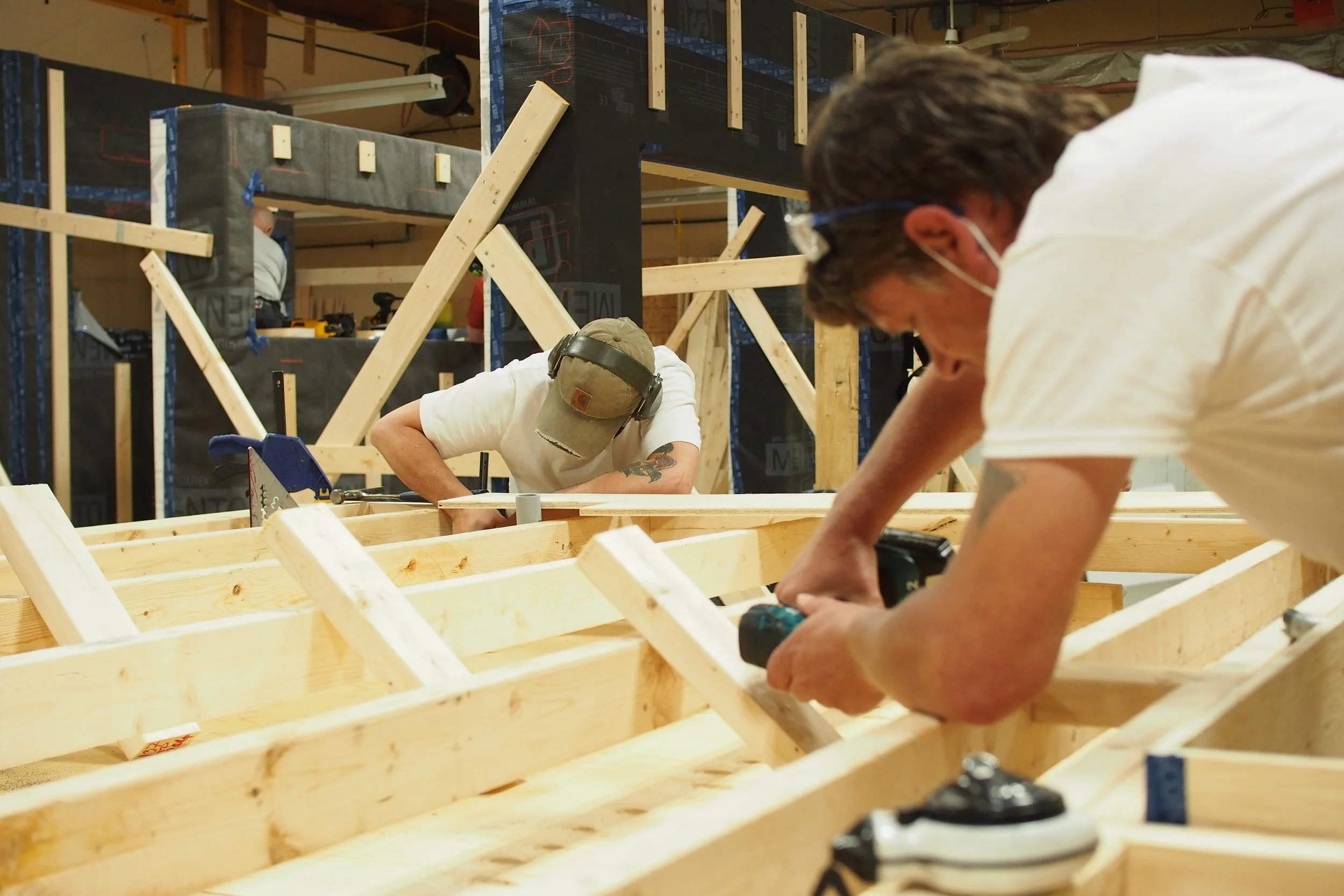Tooketree Passive Homes Provides Solutions for Affordable Housing
A lack of affordable housing has become a severe issue in Canada and many other parts of the world. The housing crisis weighs heavily on the minds of those seeking shelter for themselves and their families, community groups working to help them, and politicians mandated to find and implement solutions.
The founders of the social enterprise, Tooketree Passive Homes, have been meeting and working with community groups and politicians to demonstrate the possibilities that accompany prefabricated building systems, particularly SEED panels. Our president and CEO, Melinda Zytaruk, who is also a co-founder of the Muskoka Community Land Trust and a longtime advocate for sustainable building, was at Queen’s Park at the end of April to take part in round table discussions at the Affordable Housing Summit, along with other community leaders, government representatives and key stakeholders. Tooketree’s SEED prefab building system was also on display at the reception.
A few days earlier, on Friday, April 25th, Nate Erskine-Smith, Minister of Housing, Infrastructure and Communities for Canada, visited Tooketree Passive Homes to discuss affordable housing and tour Tooketree's manufacturing facility. The visit was arranged by local Liberal candidate, Geordie Sabbagh and his team, who were also in attendance. Tooketree’s founders, Melinda and Rick, led the tour, demonstrating the efficiencies and quality control capabilities associated with Tooketree's SEED prefab building systems, along with the company's commitment to environmental sustainability, health and safety, and accessible trades training. After the factory tour, Melinda joined Erskine-Smith and Sabbagh for an in-depth Townhall conversation and Q&A about affordable housing, climate, infrastructure and more. The well-attended event took place at Muskoka’s new Canadian Raceboat Hall of Fame.
The Tooketree team is excited to work with government representatives at all levels to help address the housing crisis using sustainable methods and materials, while also providing safe, meaningful employment and training opportunities.
A sustainable solution for affordable housing
Often touted as “the way of the future,” prefabrication offers an efficient and streamlined approach to building high-quality, durable homes and buildings.
In the construction industry, where time is money, prefab helps developers stick to tight schedules. Delays associated with weather and weather-related damage are eliminated when a building envelope is constructed indoors. Tooketree’s SEED panels are insulated and fully sealed with high-performance membranes before leaving our factory. Crane-facilitated installation is efficient; an entire building envelope can be fit and sealed together very quickly – in a matter of hours for a smaller building, and in under a week for a large multi-unit building. Tooketree’s SEED panels are CSA-certified components; careful documentation and regular factory inspection by CSA expedites the building inspection process. Because panel construction can coincide with site preparation and delays are dramatically reduced, the time factor alone makes prefab make sense for many projects. This has become a well-known benefit associated with prefab.
What is less known is the quality and durability of modern prefab systems – especially those that focus on providing a Passive-House quality building envelope. Tooketree’s SEED wall panels are generally over twelve inches thick and offer an R-value of 50+. The double-stud wall system with shear sheathing integrated mid-profile makes for a strong and solid building designed to last for many generations. Robust double-stud SEED wall panels can be employed for buildings up to six stories high.
Longevity, resilience and energy efficiency should always be prioritized. These attributes are especially important when housing and community projects are funded through public investment. In a culture that values nature and seeks solutions for climate, ecology and a circular economy, the SEED Building System offers hope.
SEED panels are fabricated with Canadian lumber and wood products. The natural insulation products used are also manufactured in Canada. High-performance “smart” membranes (currently manufactured exclusively in Europe) protect the integrity of our natural building materials and enable us to manufacture a product with low to no embodied emissions. All building materials are readily available through Canadian suppliers.
Systematized indoor fabrication makes precision the standard. Automated machinery prevents human error and provides material and time savings. Quality assurances are provided through core density testing of cellulose insulation and thorough documentation of manufacturing and spec compliance, such as nail spacing and the sealing of penetrations. A factor as simple as a worker’s ability to comfortably reach the entire area of a wall or roof/ceiling panel for the accurate application of sheathing and membranes, adds to final product quality. SEED building systems are adaptable to a range of climates and desired R-values. The thickness of the wall can be altered by increasing or decreasing the distance between the two stud walls (the insulated cavity space). The high-efficiency buildings created using SEED panels provide very significant energy savings and low-to-no operational emissions. Tooketree has been designated a Net-Zero builder by the Canadian Home Builders Association.
Tooketree’s prefab system is a scalable climate solution; our founders and designers encourage other manufacturers to adopt the system design, so much so that they have registered SEED panels within the Creative Commons, asking only that others who use the system pay it forward by sharing their own developments to the SEED system. Design details are available on Tooketree’s website, and the company regularly offers factory tours so industry partners and collaborators can take a closer look.
Job creation
Part of our affordability problem in Canada is rooted in a lack of living-wage jobs. Trade jobs are known to offer decent wages, but entry-level trade jobs that provide adequate training and a welcoming learning environment are few and far between.
Tooketree’s workshop environment lends itself to training and skill development, kickstarting trades careers. The straightforward building methodology, clear shop drawings, and helpful training providers help new tradespeople quickly gain hands-on skills and an understanding of building construction principles. The factory setting allows for heightened safety protocols and ergonomic procedures that improve workers’ well-being.
Tooketree also provides meaningful long-term employment opportunities for local tradespeople and individuals who want to keep building high-performance buildings in a safe and comfortable environment. The work is particularly attractive to tradespeople who want to take part in climate action and create an ecologically responsible product.
How can Tooketree build more?
Tooketree is currently a small, self-sustaining company with fewer than 20 workers. In anticipation of investment from stakeholders interested in addressing housing, jobs, and climate, Tooketree’s leaders are keen to expand the factory. Currently, Tooketree can produce 100 units of housing per year within medium-scale multiplex projects, which maximize interior conditioned space. Tooketree wants to double, then triple that capacity on-site, and consult other manufacturers looking to set up a similar operation.
Looking to the future, Tooketree’s team is excited to introduce more automation, streamline the SEED panel fabrication process and set up shop to achieve a leaner workflow. Ultimately, Tooketree Passive Homes could train and employ more workers, continue to improve health and safety standards, and increase production of sustainable housing to meet current and future demand.




